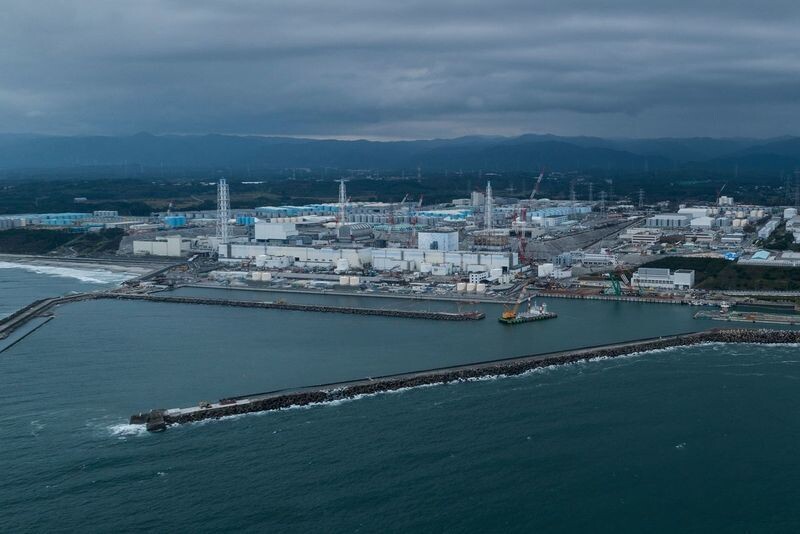hankyoreh
Links to other country sites 다른 나라 사이트 링크
NSSC chair says Japan must observe IAEA’s three principles of protection of radioactivity volumes

Uhm Jae-sik, chairperson of the Nuclear Safety and Security Commission (NSSC), said on Sept. 24 that Japan “must observe the International Atomic Energy Agency’s (IAEA) three principles of protection, namely the principles of justification, optimization, and limitation [of radioactivity volumes].” He also criticized as “inappropriate” Japan’s response of demanding that South Korea first produce scientific evidence for its warnings about dumping contaminated water from the Fukushima Nuclear Power Plant.
Speaking with reporters at the Press Center in Seoul’s Jung (Central) District that day, Uhm sent the message that the disposal of contaminated water from Fukushima is a matter best discussed fully with Japan’s neighbors and the international community. The three principles he mentioned are prescribed by the IAEA for the handling of unanticipated accidents during the construction and operation of nuclear power plants.
“The scientific bases that Japan is presented looks only at whether it satisfies the principle of limitation – in other words, when it falls within the limits for radioactivity emission. But the principles of justification and optimization need to come ahead of that,” Uhm said.
“In the process of upholding the justification and optimization principles, information must be shared in a transparent and fair way with neighboring South Korea and the international community, and there needs to be a procedure [for soliciting opinions],” he added.
Uhm went on to say that the IAEA “understands the issues and concerns we have raised and views [the ocean dump issue] as important.” On Sept. 16–20, Uhm attended the 63rd IAEA General Conference in Vienna with Moon Mi-ok, first vice minister of science and ICT.
Uhm remained quiet when asked about Seoul’s planned response if Tokyo proceeds with dumping contaminated water into the ocean.
“I don’t think it would be appropriate to make predictions when [the Japanese government] hasn’t made an official decision [to dump the water],” he said.
“If Japan does decide on an ocean dump, we will need to talk again about the unfairness of that,” he added.
“We will also need to establish the possible effects on South Korea and acquire scientific data.”
By Choi Ha-yan, staff reporter
Please direct comments or questions to [english@hani.co.kr]

Editorial・opinion
![[Column] Will Seoul’s ties with Moscow really recover on their own? [Column] Will Seoul’s ties with Moscow really recover on their own?](https://flexible.img.hani.co.kr/flexible/normal/500/300/imgdb/original/2024/0513/5917155871573919.jpg) [Column] Will Seoul’s ties with Moscow really recover on their own?
[Column] Will Seoul’s ties with Moscow really recover on their own?![[Column] Samsung’s ‘lost decade’ and Lee Jae-yong’s mismatched chopsticks [Column] Samsung’s ‘lost decade’ and Lee Jae-yong’s mismatched chopsticks](https://flexible.img.hani.co.kr/flexible/normal/500/300/imgdb/original/2024/0512/3017154788490114.jpg) [Column] Samsung’s ‘lost decade’ and Lee Jae-yong’s mismatched chopsticks
[Column] Samsung’s ‘lost decade’ and Lee Jae-yong’s mismatched chopsticks- [Correspondent’s column] The real reason the US is worried about Chinese ‘overcapacity’
- [Editorial] Yoon’s gesture at communication only highlights his reluctance to change
- [Editorial] Perilous stakes of Trump’s rhetoric around US troop pullout from Korea
- [Guest essay] Preventing Korean Peninsula from becoming front line of new cold war
- [Column] The state is back — but is it in business?
- [Column] Life on our Trisolaris
- [Editorial] Penalties for airing allegations against Korea’s first lady endanger free press
- [Editorial] Yoon must halt procurement of SM-3 interceptor missiles
Most viewed articles
- 1Ado over Line stokes anti-Japanese sentiment in Korea, discontent among Naver employees
- 2[Column] Samsung’s ‘lost decade’ and Lee Jae-yong’s mismatched chopsticks
- 3Korean opposition decries Line affair as price of Yoon’s ‘degrading’ diplomacy toward Japan
- 4US has always pulled troops from Korea unilaterally — is Yoon prepared for it to happen again?
- 5Korean auto industry on edge after US hints at ban on Chinese tech in connected cars
- 6[Editorial] Yoon’s gesture at communication only highlights his reluctance to change
- 7[Correspondent’s column] The real reason the US is worried about Chinese ‘overcapacity’
- 8[Column] Will Seoul’s ties with Moscow really recover on their own?
- 9[Photo] Korean students protest US complicity in Israel’s war outside US Embassy
- 101 in 3 S. Korean security experts support nuclear armament, CSIS finds